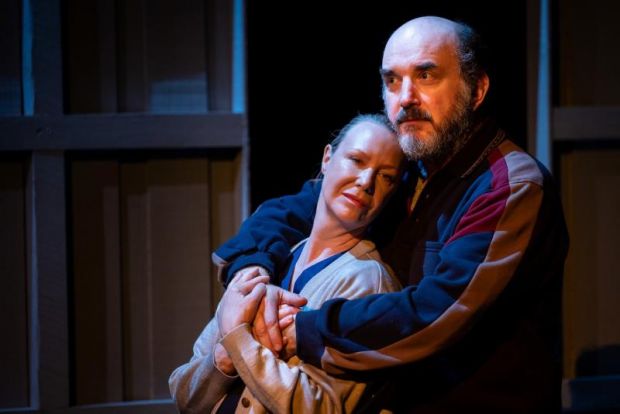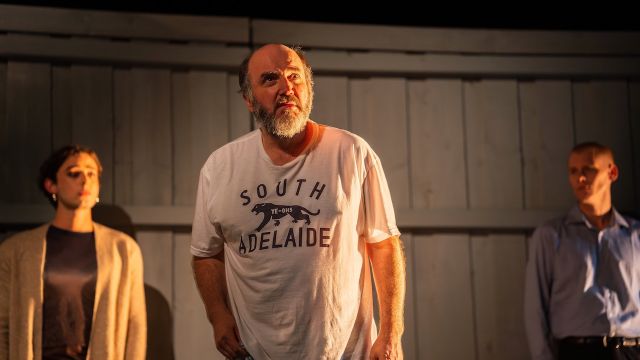Things I Know To Be True
At the beginning, Rosie (Eva Rees), youngest of the Price family children, backpacking in Europe, tells us that after her heart was broken, she tried to make a list of all the things she knew to be true… but she found in the end that it was a very short list. This is beautiful writing from Andrew Bovell. The speech – plus Rees’ sweet sincerity - gives us Rosie and her demolished innocence, and makes us care for her, and it states a key theme of this moving 2016 play about ‘ordinary people’.
As the play proceeds, many things will prove not to be true – every complacent assumption, every traditional belief, every hope that things will go on just as they are, will be shattered, and leave the Price family of Hallett’s Cove having to think again about the things that remain, the things that are, in fact, ‘true’.

The lynchpin of the family is Fran (Belinda McClory), a nurse, still working, wife, mother to four grown-up children, and no-nonsense matriarch by default. Husband Bob (Ben Grant) took the package and early retirement too early when the car factory closed; now it’s all about being ‘Dad’ and his garden. Pip (Brigid Gallacher) is an education bureaucrat, married with two children, but with a yearning she’s hiding. Mark (Tomás Kantor) is prickly and constrained, wrestling with a radical change in his life. Ben (Joss McClelland) is the hotshot in financial services but who’s still bringing his washing home for Mum. And Rosie, Bob’s baby girl, who’s come home to Dad and now she’ll always be there – won’t she?
If you wanted to be snooty – or ‘elitist’ – you might call Things That I Know To Be True ‘superior soap’ – but what takes the play way above ‘soap’ is the scarifying honesty and insight of Bovell’s writing and the way the characters are driven to say things that they shouldn’t say, mustn’t say, that you can’t say – but we all know they are things that are said. All the time.
Bovell’s characters – brought to life here by a stellar cast - are more than just themselves – and eerily we recognise them as more. What happens – on stage – is happening. While they remain specific, naturalistic and identifiable characters, they also represent oh-so-familiar instances or phenomena of our shifting modern world.

Belinda McClory’s Fran – in a marvellous, intense, almost frightening performance - is the tight, bitter older woman who keeps working because she’d go nuts if she stopped, who would be bereft of identity if she did – holding things in place with a firm hand and held in place herself by duty. Her rewards are her children and when they disappoint, confounding expectations, after all her sacrifices, she erupts in towering, foul-mouthed rage, so basic and vicious that we are agape, and we cringe in our seats. Politically incorrect? Yes – but true. The woman who can suddenly destroy her husband with an out-of-the-blue revelation that he never expected.
Ben Grant’s Bob is the amiable fellow, who’s lost his identity, the man in his sixties without the work that defined him as the provider. Under the amiability, he’s fragile. Now he gets in the way, busies himself with his gardening and bottles up his fears of any further changes. Ben Grant gives us the shocking but believable transition from the man who fears conflict, into the man of inchoate rage and violence when those changes can no longer be avoided.

Brigid Gallacher plays older daughter Pip as the steady, taken-for-granted married-with-kids woman but who tips over the apple cart and breaks away, who takes the charge of selfish and irresponsible on the chin and goes after her own happiness. Tomás Kantor’s febrile, electricity-under-the skin quality makes his Mark distinctive in his turmoil at the inescapable need to find – no, to be – a true self. Grinning, smartie-pants Ben, played by Joss McClelland, is the sadly now familiar amoral guy in finance, the working-class kid after the glittering prizes, keeping up with the even smarter, private school, rich guys. And Rosie, who, sorry, won’t always be there; her broken wing healed, she’ll takes flight. All of them, this family, so familiar
Never edging into melodrama, Things That I Know builds to painful revelations at which we wince or gasp and wish we could look away. But we don’t – and director Kitan Petkovski doesn’t shy away from them. His iteration of Bovell’s play is a full-blown emotional and physical production. He exhibits skilled, sensitive stagecraft and proves yet again an insightful and courageous storyteller.
If there is a flaw in this achievement, it is that Bovell has loaded this family with just too many major, life-changing disruptions across too short a time span – so that the play can feel schematic. By the time Ben falls through the door with his disaster, we might feel that, yes, he had to have his turn too – and the dices were certainly loaded for the Price family.

Nevertheless, the quality of writing, directing and performance probably carry us over any misgivings. We are moved by these deeply human characters and their troubles. It all takes place in the confines of an ‘ordinary’ suburban backyard, an enclosure of paling fence and shed (designed Bethany J Fellows), so familiar, and yet the site and repository of so many memories of games and squabbles and celebrations, and even fantasies of what might have been, of what should have been.
Michael Brindley
Photographers: James Reiser (top 3 images) & Andrew Bott Photography (lower 2 images).
Subscribe to our E-Newsletter, buy our latest print edition or find a Performing Arts book at Book Nook.

